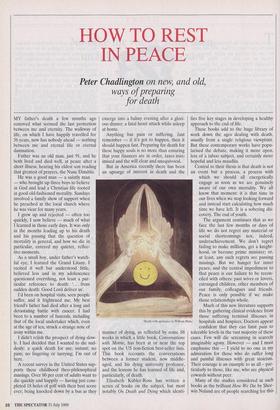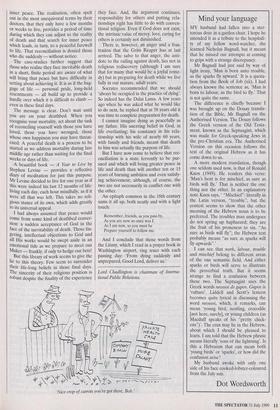HOW TO REST IN PEACE
Peter Chadlington on new, and old,
ways of preparing for death
MY father's death a few months ago removed what seemed the last protection between me and eternity. The walkway of life, on which I have happily travelled for 56 years, now has nobody ahead — nothing between me and eternal life or eternal darrmation.
Father was an old man, just 91, and he both lived and died well, at peace after a short illness, hearing his eldest son reading that greatest of prayers, the Nunc Dimittis.
He was a good man — a saintly man — who brought up three boys to believe in God and lead a Christian life rooted in good old-fashioned morality. Sundays involved a family show of support when he preached at the local church where he was vicar for many years.
I grew up and rejected — often too quickly, I now believe — much of what I learned in those early days. It was only in the months leading up to his death and his passing that the question of mortality in general, and how we die in particular, entered my quieter, reflec- tive moments.
As a small boy, under father's watch- ful eye, I learned the Grand Litany. I recited it well but understood little, believed less and in my adolescence questioned everything, not least a par- ticular reference to death: `. . from sudden death: Good Lord deliver us'.
I'd been on hospital visits, seen people suffer, and it frightened me. My best friend's father had died after a long and devastating battle with cancer. I had been to a number of funerals, including that of the local undertaker which, even at the age of ten, struck a strange note of irony within me.
I didn't relish the prospect of dying slow- ly. I had decided that I wanted to die sud- denly: a quick death for me; instant; no pain; no lingering or tarrying; I'm out of here.
A recent survey in the United States sup- ports these childhood theo-philosophical musings. Over 80 per cent of adults want to die quickly and happily — having just com- pleted 18 holes of golf with their best score ever; being knocked down by a bus as they emerge into a balmy evening after a glori- ous dinner; a fatal heart attack while asleep at home.
Anything but pain or suffering. Just remember — if it's got to happen, then it should happen fast. Preparing for death for these happy souls is no more than ensuring that your finances are in order, taxes min- imised and the will clear and unequivocal.
But in America recently there has been an upsurge of interest in death and the manner of dying, as reflected by some 88 weeks in which a little book, Conversations with Morrie, has been at or near the top spot on the US non-fiction best-seller lists. This book recounts the conversations between a former student, now middle- aged, and his dying university professor, and the lessons he has learned of life and, particularly, of death.
Elisabeth Kiibler-Ross has written a series of books on the subject, but most notably On Death and Dying which identi- fies five key stages in developing a healthy approach to the end of life.
These books add to the huge library of work down the ages dealing with death, usually from a single religious viewpoint. But these contemporary works have popu- larised the debate, making it more open, less of a taboo subject, and certainly more hopeful and less maudlin.
Central to their thesis is that death is not an event but a process, a process with which we should all energetically engage as soon as we are genuinely aware of our own mortality. We all know that moment: it is that time in our lives when we stop looking forward and instead start calculating how much time we have left. It is a sobering dis- covery. The end of youth.
The argument continues that as we face the last few months or days of life we do not regret any material or social shortcomings nor, indeed, underachievement. We don't regret failing to make millions, get a knight- hood, or become prime minister; or, at least, any such regrets are passing musings. But we hunger for inner peace, and the central impediment to that peace is our failure to be recon- ciled with others: past wives or lovers, estranged children, other members of our family, colleagues and friends. Peace is only possible if we make those relationships whole.
Much of this new literature supports this by gathering clinical evidence from those suffering terminal illnesses in hospitals and hospices. Doctors appear confident that they can limit pain to tolerable levels in the vast majority of these cases. Few will die screaming in scarcely imaginable agony. However — and I must emphasise this — I yield to no one in my admiration for those who do suffer long and painful illnesses with great stoicism. Their courage is an example to us all – par- ticularly to those, like me, who are physical cowards without peer. Many of the studies considered in such books as the brilliant How We Die by Sher- win Nuland are of people searching for this inner peace. The realisation, often spelt out in the most unequivocal terms by their doctors, that they only have a few months or weeks to live, provides a period of time during which. they can adjust to the reality of death and that search for inner peace which leads, in turn, to a peaceful farewell to life. That reconciliation is denied those who die suddenly — without notice.
The case-studies further suggest that those who realise they face inevitable death m a short, finite period are aware of what will bring that peace but have difficulty in setting about achieving it. It is as if the bag- gage of life — personal pride, long-held resentments — all build up to provide a hurdle over which it is difficult to climb even in these final days.
The message is clear. Don't wait until you are on your deathbed. When you recognise your mortality, set about the task of reconciling yourself with those you have loved, those you have wronged, those whose own happiness you may have threat- ened. A peaceful death is a process to be started as we address mortality during late middle age rather than waiting for the final weeks or days of life.
A beautiful book — A Year to Live by Stephen Levine — provides a reflective diary of meditation for just this purpose. Mr Levine decided to live for one year as if this were indeed his last 12 months of life: living each day, each hour mindfully, as if it were all that was left. This takes no reli- gious stance of its own, which adds greatly to its universal appeal. I had always assumed that peace would come from some kind of deathbed conver- sion: a sudden acceptance of God in the face of the inevitability of death. Those lin- gering, intellectual objections to God and all His works would be swept aside in an emotional tide as we prepare to meet our Maker — frankly, if only to hedge our bets! But this library of work seems to give the lie to this theory. Few seem to surrender their life-long beliefs in those final days. The sincerity of their religious position is robust despite the finality of the experience they face. And, the argument continues, responsibility for others and putting rela- tionships right has little to do with conven- tional religion. Even if God does not exist, the intrinsic value of mercy, love, caring for others is certainly not diminished.
There is, however, an anger and a frus- tration that the Grim Reaper has at last arrived. The salve to that anger, the anti- dote to the railing against death, lies not in religious rediscovery (although I am sure that for many that would be a joyful reme- dy) but in preparing for death while we live fully in our mature, adult years.
Socrates recommended that we should `always be occupied in the practice of dying'. So indeed has the Dalai Lama. A few years ago when he was asked what he would like to do next, he replied that at 58 years old it was time to complete preparation for death.
I cannot imagine dying as peacefully as my father. His unerring belief in God, in life everlasting; his constancy in his rela- tionship with his wife of nearly 60 years, with family and friends, meant that death to him was actually the purpose of life.
But I have now come to believe that rec- onciliation is a state fervently to be pur- sued and which will bring greater peace in life and death than will another ten or 15 years of burning ambition and even satisfy- ing achievement; although, of course, the two are not necessarily in conflict one with the other.
An epitaph common in the 18th century sums it all up, both neatly and with a light touch:
Remember, friends, as you pass by, As you are now so once was I. As I am now, so you must be Prepare yourself to follow me.
And I conclude that those words from the Litany, which I read in a prayer book in Washington airport, ring truer with each passing day: 'From dying suddenly and unprepared, Good Lord, deliver us.'
Lord Chadlington is chairman of Interna- tional Public Relations.
Nice crop of carrots you've got there, Bob.'



























































 Previous page
Previous page